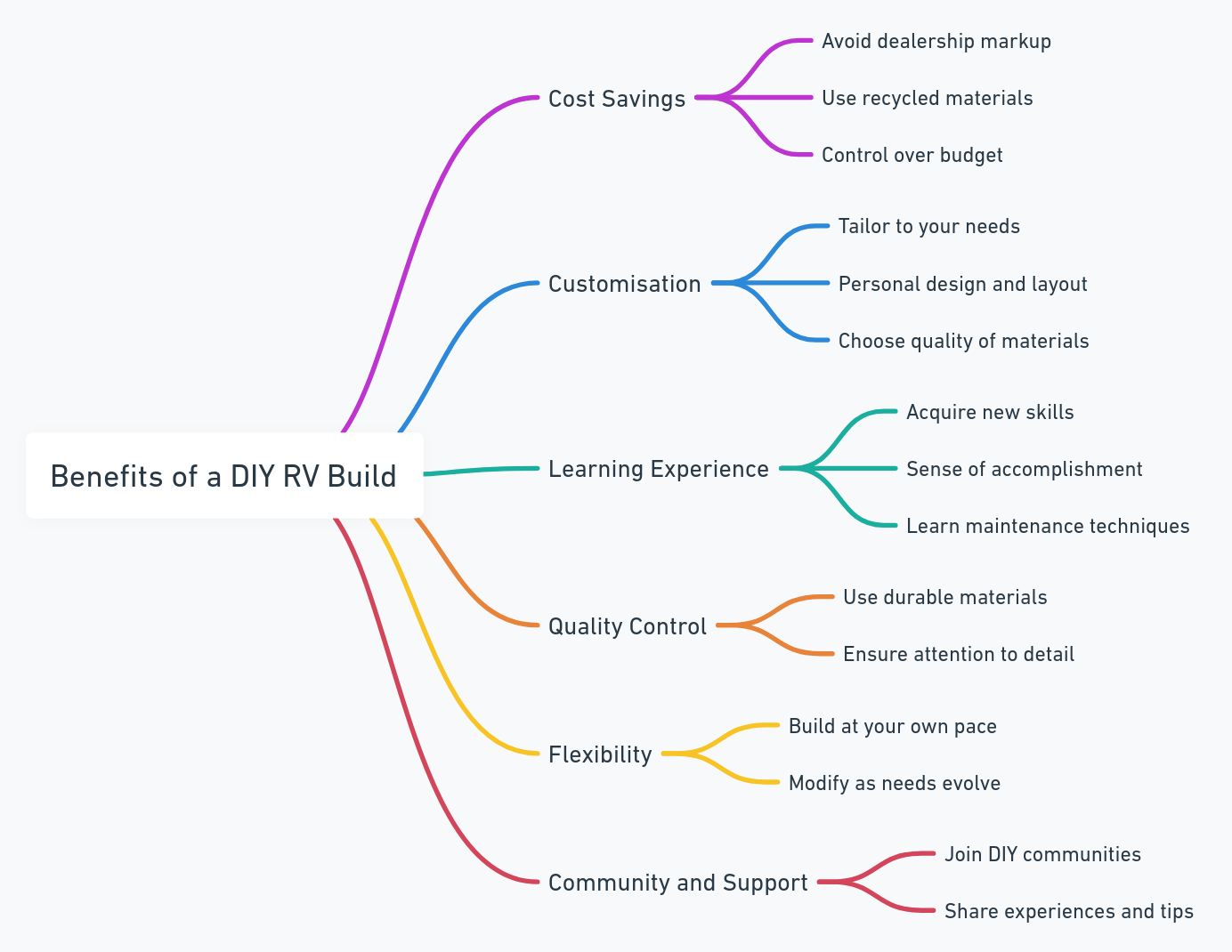Building Your Own RV
Why the DIY Approach Could Be Perfect for You
Building your own RV is more than just a project; it’s a journey toward personalisation, learning, and true freedom. A DIY RV build offers many benefits that go beyond the basic function of creating a mobile home. Here’s a look at some of the major advantages of choosing the DIY path.
Cost Saving
Building your own RV allows you to save money in several ways:
- Avoid dealership markup: When you choose the DIY route, you’re not paying the inflated prices of dealerships.
- Choose your materials: With a DIY build, you have the freedom to select the materials that best suit your needs, budget, and sustainability preferences. Whether you prioritise durability, eco-friendliness, or cost-efficiency, the choice is entirely yours.
- Control over your budget: With DIY, you have the ability to make decisions that align with your budget, allowing for flexibility in how much you spend on materials and features.
Customisation
One of the greatest benefits of building your own RV is the ability to customise it to suit your exact needs and desires:
- Tailor to your needs: Whether you need an off-grid setup, a family-friendly layout, or a sleek, minimalist design, your RV can be customised to fit your exact requirements.
- Personal design and layout: You’re in charge of every detail, from the floorplan to the finishes. This is your space, designed to reflect your personal style.
- Choose quality materials: You have the option to select materials based on your preferences for durability, comfort, and sustainability.
Learning Experience
A DIY RV build isn’t just about the end result; it’s about the process too:
- Acquire new skills: Throughout the build, you’ll learn various construction techniques, from basic carpentry to plumbing and electrical work.
- Sense of accomplishment: There’s nothing like the pride of creating something with your own hands, and completing your RV build will give you a lasting sense of satisfaction.
- Learn maintenance techniques: As you build your RV, you’ll develop the skills needed to maintain it, saving you time and money down the road.
Quality Control
When you take the reins on your RV build, you get full control over the materials and the craftsmanship:
- Use durable materials: With StyroMAX panels and other high-quality materials, you can ensure that your RV is built to last, with reliable insulation and structural integrity.
- Ensure attention to detail: You can focus on the finer details that make the RV feel like home, ensuring high standards for both form and function.
Flexibility
One of the most appealing aspects of a DIY RV build is the flexibility it offers:
- Build at your own pace: You can work on your RV as time allows, taking breaks when needed and returning to the project when you’re ready.
- Modify as needs evolve: Unlike a pre-built RV, a DIY build can be easily modified as your needs change. You can add or change features as you discover what works best for your lifestyle.
Community and Support
Building a DIY RV doesn’t mean doing it alone:
- Join the exclusive StyroMAX DIY Builders Facebook group: Connect with fellow RV builders who are using StyroMAX products. This private community is the perfect place to share experiences, exchange tips, and get feedback from others who understand the process.
- Find inspiration and support: Whether you’re troubleshooting a design challenge or looking for fresh ideas, you’ll find a wealth of inspiration and helpful advice from other builders who are navigating the same journey.
Start Your DIY RV Journey Today!
If you’re considering building your own RV, download our Initial Design Concept Checklist to help you plan your next steps.
To ensure your materials are top-quality and your build goes smoothly:
- Purchase your StyroMAX Designer Sample Pack: Get a hands-on preview of the materials you’ll use.
- Use the StyroMAX Project Management and Budgeting Tool: Stay organised and track your progress every step of the way.
This guide is intended for educational and entertainment purposes only. The information provided is based on general best practices and personal experiences. Users of this guide are advised to seek professional advice and conduct their own research tailored to their specific needs and circumstances. Always follow safety guidelines and local regulations when undertaking any DIY projects. Happy planning!

